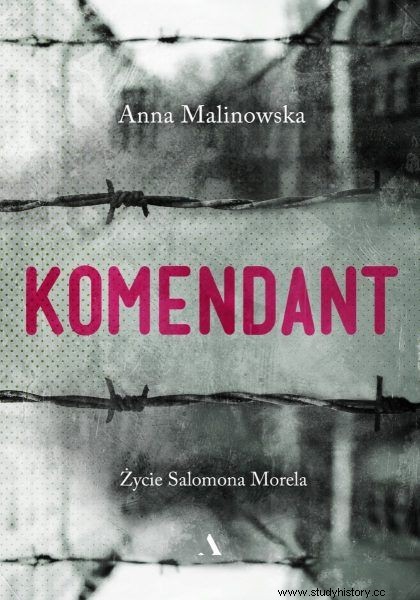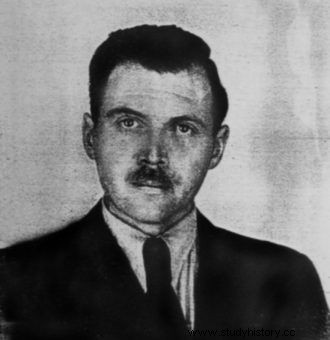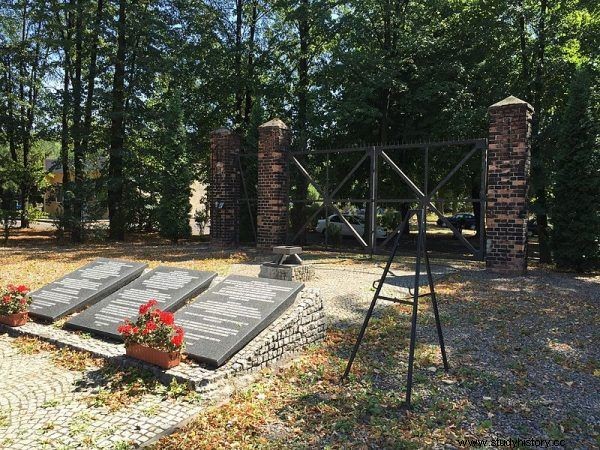Lola comes from Bedzin. Before the war, the city was full of Jews. Only a suitcase full of photos remained in Auschwitz. Lola was transported from the ghetto to the camp on August 1, 1943. She was given the number 51509. Already on the day of her arrival to Auschwitz, 1,582 people were gassed from all of Lola's transport. Among them was a little girl, Lola's daughter. She was only a year and four months old.
Out of the Potok family of thirteen who was deported to Auschwitz, only Lola survived the camp. In the ten-degree frost, she managed to escape from a column of prisoners driven during the evacuation from the camp deep into Germany. Lola is Solomon's lover now.
How nice it is to be in the army
Virgo is all day long!
Hopaj-siup! Hopa-shit!
Come on! Dana!
They used to lie on the sofa,
They are laying on the hay today!
Hopaj-siup! Hopa-shit!
Solomon wins the mandolin and the company makes another toast. Salomon probably likes life in Katowice. He has food, a roof over his head. After a stay in the forest, it's finally a change. He can be calm about the future. "Mietek", an important man from the Parczew Forests, is now an even more important persona. He is the head of the Provincial Public Security Office in Łódź. He breaks up the grouping of Stanisław Sojczyński "Warszyca", the captain of the Home Army, who formed the Polish Underground Army from his former subordinates.

The article is an excerpt from the book Komendant. The life of Solomon Morel , which was recently released on the market by the Agora publishing house
The units of Warszyc attack local PPR committees and MO posts in Łódź. Without a doubt, "Mietek" has a hard job. "Bolek", or Gustaw Alef-Bolkowiak, became the head of the Military Department of Foreign Affairs. Soon he will fly to the United States for an aviation course, will become a deputy military attaché in Washington, and later a military attaché in Belgrade. And he will take up other positions. "Adam", Stanisław Glinka, went to the militia.
To the free world
Meanwhile, Franciszek Blaichman is planning a wedding, starting a family and is thinking about leaving Poland. “There was no reason why we should stay in Poland. In connection with my work, I interviewed many Poles who, not knowing that I was a Jew, did not hide their feelings towards my kinsmen. It made me realize how deeply anti-Semitism had its roots in Poland . I was terrified of it, ”Blaichman says in his memoirs. Another partisan, Samuel Gruber, who - as Blaichman writes - is in Wrocław, is also thinking about leaving Poland. “The city was heavily bombed and chaos reigned. Shops were abandoned, factories plundered, and all goods, from sugar to furs, were removed from the buildings occupied by the Germans.
There was a police force in Wrocław, led by Gruber, but like anywhere else, it had so few officers that, as a result, it was completely powerless against the wave of robberies, ”recalls Blaichman. Eventually, she decides to leave the country. In his memoirs, he writes that he quit his job at the Security Office. "Colleagues from my department, of whom 10-15 percent. were Jews, they thought I was crazy. How could I quit my job voluntarily? With a car, a chauffeur, a motorcycle, a flat and no idea for a new job? But I have made up my mind a long time ago. ”

Many Jews dreamed of tightening the noose around Josef Mengele's neck
Blaichman and Gruber finally make it to Germany. From there they will both go to the United States. Gruber in 1949, Blaichman in the 1950s. But while still in Germany, Blaichman returns to Poland for a while. “Once we settled in Zeilsheim, I decided to come back to Poland and try to get my cousin Froim out of the country. (…) I found Froim in Katowice. I tried hard to persuade him to flee with me to the free world. He met a gentile girl, however, and he was satisfied with the life he led. He told me that Szlomo Morel, Icchak's brother, and another comrade-in-arms, felt good in Poland and that no one was going to leave the country. I was disappointed, ”writes Blaichman.
Solomon looks at Lola. She is reticent, she sips the vodka slowly. Some girls want to kiss after a few glasses, but not Lola. Solomon knows that he is only showing no affection in public. He also knows that 24-year-old Lola wants revenge. He dreams of wrapping his hands around the neck of Rudolf Höss, the commandant of Auschwitz, or the neck of Josef Mengele, the camp doctor. And she asked for a job at the Public Security Office in Katowice. She just got the post of commander of the prison in Gliwice. Before the war, the city belonged to Germany. The commandant in the prison is not working yet, because the Russians still reside in Gliwice. Lola is waiting for work and her time is shortened by an affair with Solomon. But he also meets a certain Russian colonel. Sometimes Salomon stays overnight in Lola's apartment in Katowice.
Zgoda camp
Sometimes he goes to his home, to Świętochłowice. Before the war, these belonged to Poland. There is the Zgoda steelworks in the city. It produces industrial machines. During the war, the Germans produced anti-aircraft guns here. For this, a workforce was needed. In 1942, a camp was established near Zgoda. 180 Jews were placed there. A year later it turned out that more hands were needed to work, and a branch of the Auschwitz concentration camp was established at the steelworks. The transport of local prisoners to Świętochłowice began.
The first large transport arrived on June 7, 1943. Soon after, four stone guard towers were erected next to the barracks. The whole thing is surrounded by a double barbed wire fence against the flow. It turned out that the camp was situated in a marshy area. So the assembly square, camp streets and pavements were paved. Each week, a dozen or so prisoners died in the camp. Beatings, dogs rushing and executions were commonplace. At the end of the war, prisoners from Zgody (the steelworks and the district of Świętochłowice have the same name) were evacuated twice - in December 1944 and January 23, 1945.

The Zgoda camp was subordinate to the Public Security Office. Its commander was, among others Salomon Morel.
The barracks in Świętochłowice remain empty for several weeks. The new government appreciates that the infrastructure is ready in the city located just a dozen or so kilometers from the center of Katowice. A fenced area, watchtowers, wooden barracks and a brick building for staff. Ten floodlights illuminate the camp after dark. Everything is ready and functional. In February 1945, a camp in Świętochłowice, subordinate to the Department of Prisons and Camps of the Ministry of Public Security, was established. At first it is called the Penal Camp, but in April it functions as the Labor Camp in Świętochłowice. The change takes place after the establishment of the Central Labor Camp in Jaworzno, to which Świętochłowice are subject.
Did young Shlomo, hiding in a barn or in a pine forest, expect that he would live next to a camp fenced with live wire? Live in a place like this without fear? That the roles will reverse and he will not be afraid, but others will be afraid of him? Salomon Morel, despite the opinion of a "harmful element", got a kick up from the new government. He is to manage the camp in Świętochłowice. Initially together with Aleksy Krut, but soon he becomes the only master of the camp estates. He knows from his superiors that Germans, collaborators, and a subversive element will be sent to Zgoda. Perhaps, thinks Salomon, those who once worked at Majdanek will end up here. Solomon heard of them. In 1989, he will tell John Sack, one of the few journalists he has spoken with, about how his hatred of the Germans was born during the war. As he watched the prisoners end up in Harmony, he wondered if there were any of them who were active in his homeland.
Majdanek
When he was still in the partisans, he heard what the SS had organized at Majdanek, murdering thousands of Jews. And then - when he would confide in Sack - he promised himself revenge. After the liberation of Majdanek, he saw several former guards standing on cars with noose around their necks, and Polish and Jewish drivers starting their engines and driving away.
These are the words of Solomon, quoted by Sack. Was there really a desire for revenge in him? How and when was it born? Among the trees of Lublin's forests? At the Lublin Castle? Was his desire for revenge fueling Lola? Did she tell him in detail about her life in the camp? Can Solomon have a complete picture of what the Germans were doing in the concentration camps? He did not see what, for example, Jan Karski, the legendary underground courier, who got to one of the camps in the uniform of a Ukrainian guard. He himself was convinced for years that he had ended up in Bełżec, but later it turned out that it had to be Izbica Lubelska.
We passed an old Jew, a man of about sixty, sitting on the ground completely naked. (…) He was sitting on the ground without moving, and nobody paid the slightest attention to him. No muscle in his body even twitched.
He could have been considered dead or petrified with fear, if not for his unnaturally animated eyes, with which he blinked rapidly and constantly. Near him, a small child was lying on the ground, wrapped in rags. The lonely, huddled old man stared straight ahead with the large, frightened eyes of a rabbit. Neither did anyone care.
The mass of Jews vibrated, twitched and poured back and forth like in a collective, insane, rhythmic trance. They waved their hands, shouted, argued and cursed, spat on each other. Hunger, hunger, fear and exhaustion drove them all crazy. I learned that they were usually left in this camp for three or four days, without a drop of water or food
- wrote Karski.

The article is an excerpt from the book Komendant. The life of Solomon Morel, which was recently released on the market by Agora Publishing House
It also shows what happened on the camp ramp when the train carriages arrived.Two wagons were literally bursting at the seams, tightly packed with human bodies, completely jammed. (...) The floors of the carriages were sprinkled with a layer of thick white powder in advance. It was quicklime. The lime is simply powdered calcium oxide. Whoever has seen cement mix knows what happens when lime is poured over water. Such a mixture then begins to buzz and hiss, and slaking lime is accompanied by the release of significant amounts of heat. (…) A humid human body becomes dehydrated when it comes into contact with lime and it causes burns. (…) In addition, lime prevents the spread of germs that feed on decaying carcasses. It turned out to be an effective and inexpensive means - ideal for Nazi purposes
- wrote Karski.
Izbica Lubelska, a less known extension of Bełżec, played an important role in the plan to exterminate Jews during Operation Reinhard. Morel knew what a concentration camp was. My grandfather, Walenty Tkaczyk, was in Majdanek. They let him out, but he was a wreck of a man. Grandpa told what happened there. About hitting, sleeping on the ground, pouring cold water on assemblies. My mother and my uncle told Morel about it. He also knew that my father had died in this hell on earth. They took him in October, and on November 27 he was dead - says Tadeusz Filipek. Is that why Morel greeted the prisoners brought to the Concord with the words:"I have been in Auschwitz for six long years and I have sworn to myself that if I leave there, I will pay you, the Nazis, for everything". After all, Morel never ended up in Auschwitz.
The article is an excerpt from the book Komendant. Życie Salomon Morel, which was recently released on the market by Agora
